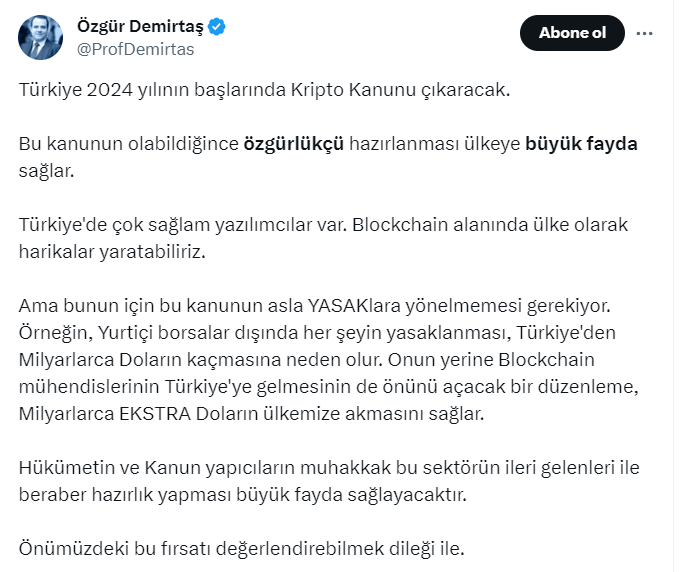Prof. Dr. Özgür Demirtaş announces that a comprehensive Crypto Law will come into effect at the beginning of 2024, sharing his views on this exciting development for Turkey. Demirtaş emphasizes the need for a liberal and inclusive approach to maximize the country’s potential in the developing Blockchain sector. Highlighting Turkey’s pool of talented software developers, Demirtaş foresees transformative progress in the Blockchain industry.
Unlocking Turkey’s Blockchain Potential: Avoiding Bans for Prosperity
Demirtaş underlines the importance of preparing a Crypto Law that encourages innovation and growth instead of imposing bans. Turkey has a highly skilled cadre of software developers ready to make significant contributions to the Blockchain field.

A key aspect of the proposed legislation should be to avoid unnecessary restrictions and ensure the country remains an attractive hub for Blockchain engineers.
Warning Against the Outflow of Dollars
Demirtaş advocates for a collaborative effort among the government, lawmakers, and industry leaders in formulating Turkey’s Crypto Law. By adopting a liberal approach and avoiding prohibitive measures, the legislation could position Turkey as a global powerhouse in the Blockchain field.
The influx of Blockchain engineers and investments could usher in a new era of economic prosperity with billions of additional dollars flowing into the country. As the regulatory environment takes shape, Turkey is preparing to emerge as a leader in the evolving world of cryptocurrency and Blockchain technology.
On the other hand, Demirtaş warns that banning everything except domestic exchanges could lead to the outflow of billions of dollars from Turkey. According to Demirtaş, instead of doing this, a regulation that opens the way for Blockchain engineers to come to Turkey could lead to billions of extra dollars entering the country.
Recently, Tansel Kaya made a statement saying that with global developments, the risks associated with BTC would disappear, and he pointed out that the distinction between local and foreign exchanges was not logical. Kaya mentioned that many exchanges get their order books from exchanges abroad, highlighting this as an unresolved issue.
Kaya himself answered the question, suggesting that exchanges will likely be allowed to import crypto, and in such a case, local exchanges, not individuals, would be able to buy cryptocurrency.

 Türkçe
Türkçe Español
Español










